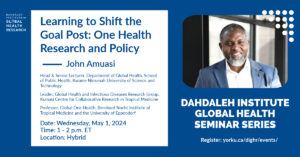Post
Published on July 30, 2024

On May 1, 2024, Dr. John Amuasi (Kwame Nkrumah University of Science and Technology) delivered a seminar emphasizing the necessity of adapting goals within the One Health framework. Dr. Amuasi addressed the traditionally negative perceptions of shifting goalposts that are often seen as preventing positive outcomes, particularly evident during the COVID-19 pandemic. However, shifting goalposts can be crucial for scientific progress and public health. He provided a historical context by referencing Hippocrates' humoral theory, linking health to the balance of bodily fluids, and Ignaz Semmelweis' advocacy for handwashing to prevent puerperal fever. Both examples show that shifting goalposts are essential because scientific knowledge is dynamic and constantly evolving, requiring updates to maintain relevance and effectiveness.
Through exploring the complexity of One Health systems, which integrate human, animal, and environmental health, Dr. Amuasi argued that the dynamic nature of these systems necessitates shifting goalposts. He illustrated examples from recent clinical studies, where adaptive platform trials required changes in sample sizes and protocols to remain effective and relevant. In a complex and interconnected world, health interventions must be flexible and responsive to new data and changing conditions.

The seminar included a case study on anti-malarial drugs, demonstrating how health system factors influence treatment effectiveness in different regions. Dr. Amuasi emphasized health system factors, such as local practices and infrastructure, significantly impact treatment outcomes. This case study underscored the need for localized strategies and continuous adaptation to achieve optimal health outcomes. He stressed that recognizing and managing these trade-offs is essential for effective public health policy.
Dr. Amuasi concluded with a call for continuous improvement and adaptation in One Health, discussing that shifting goalposts based on evolving scientific knowledge is crucial for achieving sustainable health outcomes. This dynamic approach is essential for addressing the complex challenges faced by One Health and integrating new scientific insights into practice. The seminar underscored the importance of flexibility and a willingness to adapt in the pursuit of improved global health outcomes.
Watch the seminar presentation below:
Connect with Dr. John Amuasi
Themes | Global Health Foresighting |
Status | Active |
Related Work |
N/A
|
Updates |
N/A
|
People |
N/A
|
You may also be interested in...
Addressing the Risk Environment in Prison: Learnings from a Study Evaluating Canada’s Prison Needle Exchange Program
The 12th International Conference on Health and Hepatitis in Substance Users (INHSU) is an international conference bringing together researchers, clinicians, advocates, and communities of people who use drugs to advance health equity and evidence-based practice ...Read more about this Post
Dahdaleh Researchers Receive $5.9M From New Frontiers Research Fund to Support Climate Change Adaptation and Mitigation Efforts
On June 3, 2024, the New Frontiers Research Fund (NFRF) announced $92 million funding to support 165 new and groundbreaking Canadian-led initiatives: the 2023 International Joint Initiative for Research in Climate Change Adaptation and Mitigation ...Read more about this Post
Don't Miss Our November Lineup of Events
Join us for a November packed with insightful seminars, inspiring guests, and the launch of SWOT v2. Start off the month with a public seminar by visionary designer and Dahdaleh Institute community fellow Bruce Mau. ...Read more about this Post
